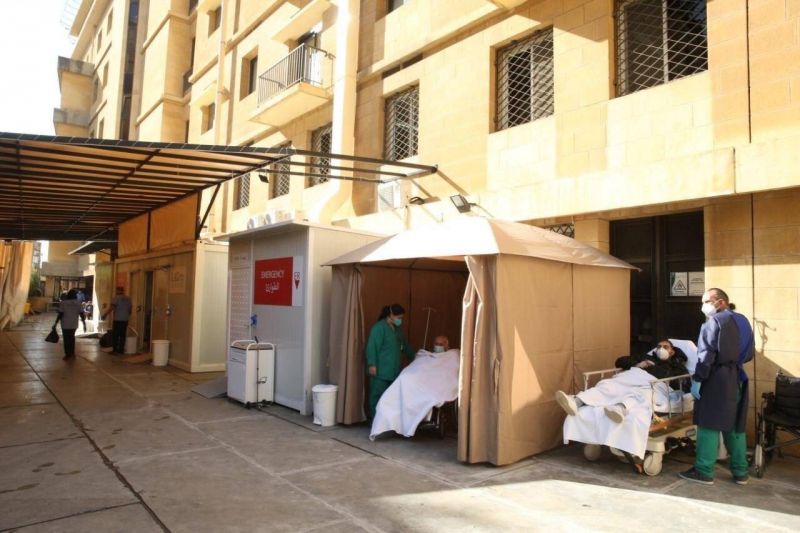
Overflow coronavirus patients are being treated in tents outside Rizk Hospital in Beirut. (Credit: LAU Medical Center-Rizk Hospital)
BEIRUT — At least one Beirut hospital is housing coronavirus patients in tents outdoors, as the health sector’s battle against COVID-19 rages on.
Emile Ghazal, the marketing coordinator at LAU Medical Center-Rizk Hospital, told L’Orient Today that the hospital is currently treating patients with COVID-19 in tents and containers set up in the hospital’s parking lot. The hospital, he says, has installed heaters outdoors to keep the patients warm.
On Saturday, the country recorded a lower-than-usual number of new cases of the disease — 2,631 — while caretaker Health Minister Hamad Hassan announced that pharma giant Pfizer had confirmed it would deliver coronavirus vaccines to Lebanon in mid-Febuary. He also said the World Health Organization’s COVAX platform had notified his ministry that the first shipment of the AstraZeneca vaccine would arrive at the end of next month.
However, Saturday also brought news of 61 new deaths from the disease, as well as 955 patients in ICU — an all-time high. The WHO reported the ICU occupancy rate for regular COVID-19 beds in Lebanon at 82 percent and at 93 percent for ICU beds as of Friday night.
The array of challenges the health care sector faces in confronting the pandemic persists.
At Rizk Hospital, which has resorted to putting patients in tents, a whole floor is being emptied and prepared for COVID-19 cases, but a lack of equipment is slowing its opening.
Georges Ghanem, the hospital’s chief medical officer, explained that the major difficulty in providing the necessary equipment is financial.
“Fresh dollars are required in cash to buy equipment,” he said.
Nabatieh’s Nabih Berri Governmental University Hospital is facing similar difficulties, according to its director, Hassan Wazni.
“The hospital is trying to expand and make 30 beds available for COVID-19 patients,” said Wazni; however, while “around 27 of these beds have the infrastructure needed to host ICU technology, finalization depends on whether or not enough monitors and negative pressure devices are delivered by the Health Ministry and UNHCR,” the UN refugee agency.
Although faced with similar financial difficulties in providing equipment and supplies, hospitals in Tripoli are doing “way better than Beirut,” according to Jinane Bakour, the spokesperson at Haykel Hospital in Tripoli.
“We are not going through the fuss of having to treat people in the parking lot or on the streets as witnessed in Beirut,” Bakour told L’Orient Today.
“We are also not facing capacity problems at Haykel, as we have around 55 beds ready to host COVID-19 patients, and the number of actual patients is not rising above 50 at once.”
The head of New Mazloum Hospital in Tripoli, Alissar Yassin Haddad, said the health situation in the city had not reached the catastrophic levels seen in other areas of the country, but is concerned about the impact ongoing protests in the city may have in weeks to come.
Around 200 protesters set tires on fire at the city’s Abou Ali roundabout on Saturday afternoon, calling for the release of a 17-year-old they say was wrongly arrested for setting city hall alight on Thursday night. Later in the evening, dozens gathered in Al-Nour Square, again burning tires.
Demonstrations have been ongoing in the city over the past week in protest of a lack of government assistance in the face of lost income and high unemployment brought about by the total lockdown and the deteriorating economic situation in the country. Security forces have used tear gas, rubber bullets and live ammunition in an effort to disperse protesters, leading to the death of one demonstrator.
“Our situation is much better than that of Beirut, but as protests continue, we expect more people to catch the virus and the number of cases to rise soon,” Haddad said.
“In the meantime, we don't have capacity issues, in fact we are accepting patients from outside Tripoli, namely Batroun,” she added.
Access to equipment, however, is also an issue in Tripoli. Bakour said she was disappointed that her hospital had not received more ventilators.
But she is also concerned about her hospital’s ability to staff an expansion of its COVID-19 facilities in the event of a surge in the region. “What’s the point behind expanding and creating new sections if there is no one to work there?” she asked.